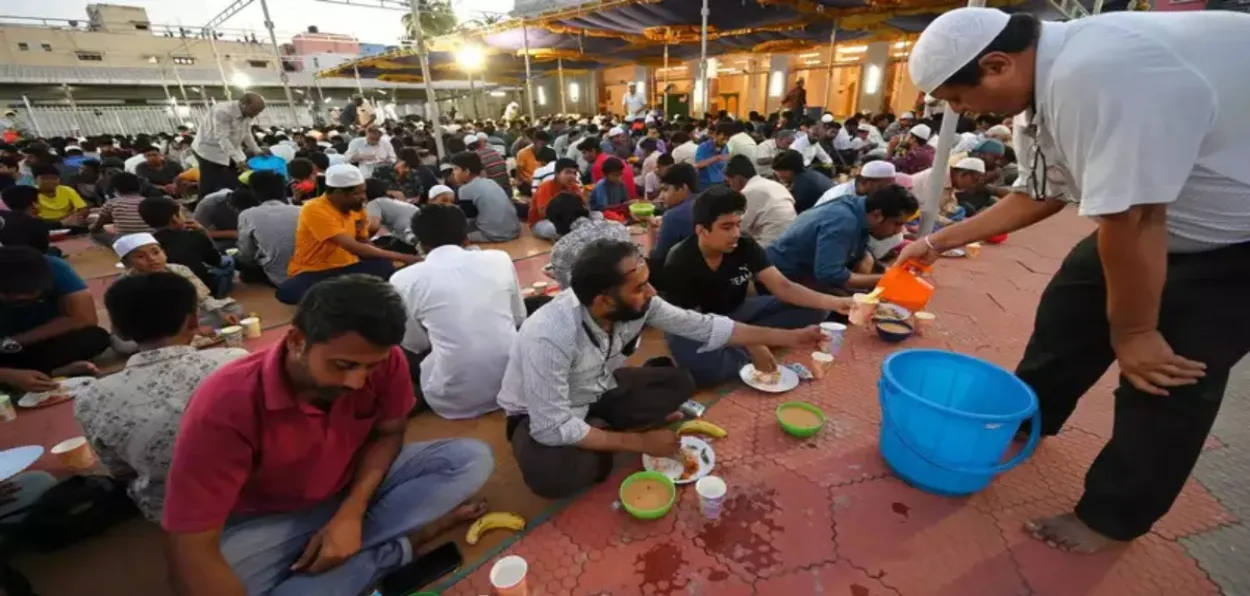
Poja Nayak
Among many Iftars organized by non-Muslims during the about-to-be-concluded Ramzan to emphasize the unity of Indians and religions, the one organized by the Sufidar temple of Chennai, Tamil Nadu, stands out.
Volunteers – both Hindus and Muslims – are involved in preparing an elaborate meal for 1200 persons, ferrying it to a mosque, and serving the fasting Muslims with devotion and respect every day for 40 years.
The story of this temple is interesting. Located in Mylapore, the temple was built by a Hindu to propagate the teachings of Shehanshah Baba Nebhraj, a Sufi saint from Sindh.
Today, the temple is known as a great example of religious harmony.
The walls of the temple are decorated with paintings of various Sufi saints, Hindu saints, Jesus Christ, Mother Mary, Guru Nanak, and other Sikh Gurus, leaders of the Radhaswami and Chidakashi sects, and Sai Baba.
Dada Ratanchand, the temple's founder, initiated Iftar gatherings for Muslim brothers during Ramadan 40 years ago. After he passed away the tradition is continued by the Sufidar temple management.
Dada Ratanchand hailed from the Sindh province of Pakistan. During the partition of 1947, he came to India. He began his life as a refugee in Chennai where he worked in a shop on Godown Road.
As a child, Ratanchandani was inclined to spirituality. When he became well off over some time, he built a temple dedicated to Sufi saints from Sindh.
The tradition of hosting Iftar gatherings during Ramadan began when members of the Arcot families visited the Sufidar temple and were impressed with its cleanliness and arrangements. From that day onwards, the Muslim rulers of Arcot entrusted the task of preparing Iftar meals during Ramadan to Ratanchand's temple.
The pure vegetarian food is meant to be served to the fasting Muslims who come to the Wallajah Masjid to break their fast.
.jpg)
Volunteers of the Temple ready to serve food for Iftar
Wallajah Masjid was constructed in 1795 by the Nawabs of Arcot. Interestingly, most of the mosque's employees are Hindus.
Dada Ratanchand continued this work until the age of 80. After his death, one of his followers Ramdev led a group of volunteers to continue the tradition of hosting Iftar.
Ramdev says they deliver food to Wallajah Masjid by 5:30 pm, prompting them to begin work at 7:30 am.
The temple on Radhakrishna Road in Mylapore prepares enough food for nearly 1,200 people each day, including fried rice, biryani, various vegetable pickles, saffron milk, and fruits.
The food is then transported to the mosque in a cargo van, with 60-70 volunteers covering their heads with a cap, traditionally worn by Muslims to serve the meals. This practice fosters sensitivity and respect towards Islam.
In an interview with the Times of India, Ramdev expressed his dedication to service, stating, "I couldn't dedicate much time to this endeavour due to my automobile shop, so I decided to leave the business and commit myself full-time to this service. Volunteers from Maharashtra and Rajasthan also come to serve here.”
Prince Nawab Abdul Ali of Arcot commended this tradition of communal reconciliation. He told the media that even after more than three decades, the service providers of Sufidar temple continue to organize Iftar every day during Ramadan, which is truly commendable. They carry out their service with utmost sincerity and loyalty to Islam.
He said, "In a secular country like India, everyone should respect each other's religions. We are all children of the same God, so we should treat each other as brothers and sisters. We must show the world that we are one."
Jamila, 50, who also breaks her fast at the Masjid, said, "I work near the mosque. Since my house is far from here, I have Iftar here after work before going home."
ALSO READ: Singers Ghulam Hassan and Shivani Singh are looking forward to their fifth Eid together
Dada Ratanchand's initiative to promote religious harmony has evolved into a movement through the Sufidar temple. This initiative, along with the participation of thousands of citizens from both religions, sets a remarkable example of religious harmony and national unity for the country.
